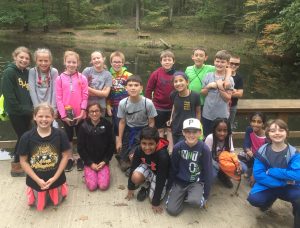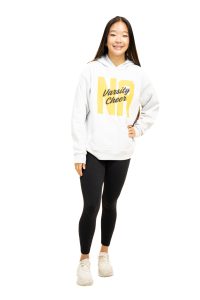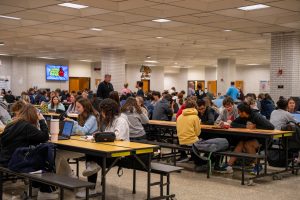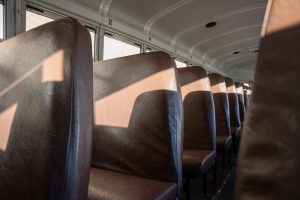The Purpose-Driven Life
Victoria Ren, this year’s Student Council Vice-President, is a model of determination and achievement in and out of the classroom.
December 22, 2020
Did you always know that you wanted to be a part of Student Council?
Student Council had been something I knew vaguely because of my brother but never intended to be a part of–or at least not as involved as I am now. The prospect of running scared and still scares me because you’re directly inviting open assessments of your competency and character from peers. Especially as you’re trying to understand your identity and place in the world, it can feel conflicting and harsh. But because of that exact fear and discomfort, I decided to give it a shot in 7th grade. From then on, after ransacking Dollar General for Pinterest pixie lights, swashing burnt orange paint on food drive signs, and laughing off the day at team meetings, I consciously chose to stick with it. To me, Student Council is the perfect intersection between organizing events, building a team, and having fun–all with people I like for a community I love.
What clubs here at NASH have you participated in?
These past two and some years, I’ve bounced around various clubs from DECA to Key Club, trying to find some semblance of community. I often find myself contemplating whether I could possibly like physics or digital media or anything I haven’t had the chance to fully experience, so I can be indecisive and scatterbrained at times. But even so, I’ve found my home in Speech and Debate, NA for Change, Student Council, Science Club, and Euro Challenge.
Have you started any of your own clubs and are you the president of any?
At the end of 8th grade, after attending a camp rooted in peer mentorship and authentic learning (run by older high school students at North Allegheny), my newfound friend Ashna and I found a need for this same inclusive, for-youth, by-youth environment at the forefront of innovation–STEM. As an avid participant of competitive math and science activities in middle school, I often felt like I was trying to be a caricature of someone whom I wasn’t, feigning enthusiasm in areas I simply took no interest in. So, STEM & Buds was born in hopes of providing an environment that bridged STEM & Storytelling–two diametrically opposed arenas. We pair high school mentors with younger students to tackle relevant, interdisciplinary issues, clearly communicate their work, and above all, build lasting support systems through after-school chapters, summer camps, and outreach programs.
“How to Reduce Racism in Biology” by The New York Times spurred a second project: Stuff We Don’t Learn in School (SWDLS). Echoed frequently by students, school can feel highly theoretical and impractical; what’s the point in learning x, y, z? At SWDLS, our goal is to answer the question of why what we learn and how that knowledge is relevant in the context of the social, political, and economic issues of our time through bi-weekly podcasts (the why), newsletters (the what), resources (what you can do), and now, campaigns (partnerships).
Both of these ideas would not be possible without lovely, talented, and dedicated people–shoutout to the STEM & Buds team & SWDLS team (Sam, Jenny, Gloria, Sophie, & Emma – you’re all the best).
In the future, do you hope to have additional leadership positions?
Honestly, I’m not sure. Right now, I think leading is where I can give back most and feel most fulfilled. This sounds quite contrived, but as of late, I’ve genuinely felt excited before I sleep, when I wake, and during spare times, envisioning change and what I can do within these two areas: education reform and meaningful discourse. I have one general principle I try to follow, though. I don’t want to ever be in the position of leading for the sake of leading, influenced by power rather than purpose. If I’m not right to lead, I don’t want to take the job.
What would be your dream job and why?
I don’t think I have a singular dream job, though I hope to check off some experiences on my bucket list. Some of those include consulting. The business world is often characterized by Wall Street moguls and stringent, taxing hours, but in the wake of our shared connectivity and a more common set of ideals and principles, mission-driven companies and organizations seem to be a future cornerstone of our economy, and I would like to be a part of that.
Education and technology startups–two realms that hold unparalleled potential for change. People like Sal Khan, founder of Khan Academy, or Andrew Ng and Daphne Koller, founders of Coursera, have revolutionized how we learn, what we learn, and who can learn. I hope to be working on something like that, maybe in a basement with leftover pizza and a draining bank account–or whatever startup life is like. (Also, I would love to become an elementary teacher at some point.)
Last big checklist point: politics. I’m still not sure in what role, whether that be an organizer or candidate. I firmly believe that government can be one of the greatest acts of public service where laws are established and people are impacted. (Plus, I love The West Wing!)
Bonus: I whole-heartedly LOVE Brandon Stanton’s work with Humans of New York (HONY) & Koreen’s creation of We’re Not Really Strangers (WRNS)–some sort of venture with human connection and stories would be a dream come true.
What is your favorite part of being a part of clubs?
Apart from the people, each club holds something dear to me. For example, with Speech and Debate, the routine of wincing at self-recordings, scrambling to the Pittsburgh airport, contemplating completing homework or hanging out between rounds, and the feeling before, during, after speaking to an audience with the purpose of persuading are what draw me in. Or take Science Club: understanding youth e-cigarette usage through analyzing larger trends and, in turn, redefining drug education and prevention is why I stick with it.
What is your favorite class you are taking this year and why?
This is tough! I have really been enjoying APUSH, English, and Statistics. APUSH has been the first time I’ve been able to understand the significance of learning the past as it connects to the present. Critically analyzing the causes and effects of certain events as opposed to rote memorization has forced me to reconsider the way I approach and evaluate the role people, government, and society play. English has been a place where genuine discussion of rather romantic concepts is encouraged from enlightenment thinking to Emerson’s transcendentalism. We’ve also begun to break down the fundamentals of rhetoric–a tool that wields the power to galvanize masses. Finally, Statistics (which I’m probably biased towards, since my parents’ work in the field) remains the middle ground of humanities and STEM for me. Math is applied, numbers have meaning, and context is relevant. This class serves as a reminder that numbers can and are weaponized, so we must understand them.
Is there anyone who has had a major impact on your academic achievements?
Yes, 100%. My sincerest shoutout to my third grade teacher: Mrs. Price (now, Mrs. Dulick I believe.) It is impossible to articulate how much she has changed who I am–she is a testament to power and beauty of education and educators. For the beginning part of my life, I was the kid who was deafeningly shy–the one who’d choose the left-back desk, who learned the ins and outs of avoiding questions, who hid behind shadows of doubt–until I met Mrs. Price. I can’t explain what happened, but to my third grade self, it was more than apparent she cared about me: how I was doing, what I found interesting, and what I hoped to achieve. That simple, prolonged emotion of feeling welcome made me feel safe, and my parents like to say I “bloomed” after that.
There are tens of hundreds of more people whom I have an immense and intense amount of gratitude for. My parents–they allow me to go down my own rabbit holes and find myself on my terms with limitless support. My brother–behind a cover of bold charisma and an air of dominance is someone who has shown me what real confidence and meaningful interaction look like. Friends–they indulge my existential thoughts and wack jokes and make everything enjoyable. Hildy–truly the greatest. He serves as a mentor figure and is someone I feel comfortable expressing emotions and thoughts to. Mrs. Ruffolo–though we met this year, her determination to provide students with the best opportunities and agency to achieve their potential is evident and greatly appreciated.













